Room Let Agreement Template UK (Lodger Agreement) – What You Need to Know
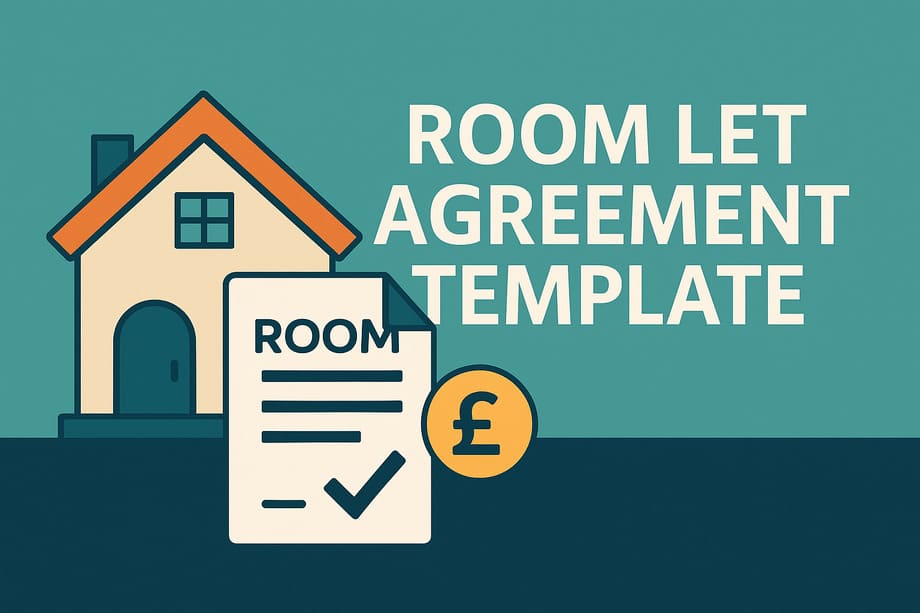
If you’re thinking about renting out a room in your property or need to rent one yourself, having the right agreement in place is essential. But with different types of room rental agreements available, it can be confusing to know which one you need and what should be included.
Whether you’re a homeowner looking to earn extra income from a spare room, a landlord renting out individual rooms, or a tenant wanting to sublet, understanding the basics of room let agreements will help protect your interests and avoid legal problems.
This guide explains the different types of room rental agreements in the UK and what you need to include to stay on the right side of the law.
What is a Room Let Agreement?
A room let agreement is a legal contract between someone who owns or rents a property and someone who wants to rent just a room within that property. It sets out the terms and conditions for the room rental, including rent, responsibilities, and house rules.
However, the type of agreement you need depends on your situation:
Lodger Agreement: Used when you live in the property and rent out a spare room Room-Only Tenancy: Used when you don’t live in the property but want to rent out individual rooms Room Rental Agreement: Used when a tenant wants to sublet their room to someone else
Getting the right type of agreement is important because each one has different legal implications and protections.
Lodger Agreement vs Room Let Agreement
What is a Lodger Agreement?
A lodger agreement is used when you live in a property as your main home and want to rent out a spare room to someone who will share the house with you.
When to use a lodger agreement:
- You live in the property as your main residence
- You’re renting out one or more spare rooms
- You’ll share common areas like the kitchen, bathroom, or living room
- You want to keep control over your home
Key features:
- Creates a “licence to occupy” not a tenancy
- Easier to end the arrangement
- No need for court orders to evict
- You can claim up to £7,500 tax-free per year under the Rent a Room Scheme
What is a Room-Only Tenancy?
A room-only tenancy is used when you don’t live in the property but want to rent out individual rooms rather than the whole house to a group of people.
When to use a room-only tenancy:
- You don’t live in the property
- You want each person to be responsible only for their own room
- You want to avoid joint tenancy complications
- Each room will have its own separate agreement
Key features:
- Each room has its own Assured Shorthold Tenancy (AST)
- Tenants have full legal rights
- Requires formal eviction procedures
- Deposits must be protected in government schemes
Do I Need a Room Let Agreement?
You Need a Lodger Agreement If:
- You live in the property as your main home
- You want to rent out spare rooms while continuing to live there
- You’ll share facilities like kitchen and bathroom with the lodger
- You want simple arrangements that are easy to change
- You want to benefit from the Rent a Room tax allowance
You Need a Room-Only Tenancy If:
- You don’t live in the property
- You own a house and want to rent out individual rooms
- You want each tenant to be responsible only for their own space
- You’re happy to give tenants exclusive use of their rooms
- You want to avoid problems with joint tenants
You Need Permission If:
- You’re a tenant yourself and want to sublet a room
- Your lease doesn’t allow subletting
- You’re a leaseholder and your lease restricts lodgers
- You have a mortgage and need lender approval
What Should Be Included in a Room Let Agreement?
Basic Information
People Involved:
- Full names and addresses of everyone
- Contact details including phone numbers
- Emergency contact information
Property Details:
- Full address of the property
- Which room is being rented
- What shared areas can be used (kitchen, bathroom, living room)
- Any areas that are private or off-limits
Money Matters:
- How much rent/licence fee per week or month
- When rent is due and how to pay
- How much deposit is required
- Who pays for utilities and bills
Terms and Conditions
How Long:
- Start date of the agreement
- End date if it’s for a fixed period
- How much notice either party needs to give to end it
House Rules:
- Whether guests are allowed and for how long
- Rules about noise, especially quiet hours
- Whether pets are allowed
- Smoking policy
- Use of shared areas
Responsibilities:
- Who cleans what areas
- Who pays for damage
- How to report repairs
- Who buys household supplies
Legal Requirements
For All Agreements:
- Right to Rent checks must be completed
- Gas and electrical safety certificates
- Basic fire safety measures
For Room-Only Tenancies:
- Deposit protection in government-approved scheme
- Providing required documents like How to Rent guide
- Energy Performance Certificate
How Much Should I Charge for a Room?
Setting the Right Rent
Research Local Prices:
- Check similar rooms in your area on SpareRoom, Rightmove, or Zoopla
- Consider what’s included (bills, internet, furnishing)
- Factor in the size and condition of the room
What to Include:
- Some landlords include all bills in the rent
- Others charge separately for utilities
- Consider including internet and TV licence
- Be clear about what’s included and what isn’t
For Lodger Agreements:
- Remember you can earn up to £7,500 tax-free per year
- This works out to about £625 per month
- If you earn more, you’ll need to pay tax on the excess
Common Mistakes to Avoid
Using the Wrong Type of Agreement
Don’t Use a Lodger Agreement If:
- You don’t live in the property
- You only visit occasionally
- The property isn’t your main home
Don’t Use a Room Tenancy If:
- You live in the property full-time
- You want to keep things simple
- You share living space with the occupant
Missing Important Terms
Always Include:
- Clear description of what areas can be used
- Exactly what’s included in the rent
- House rules about guests, noise, and cleanliness
- How much notice is needed to end the agreement
Common Problems:
- Not being clear about shared areas
- Forgetting to mention utility costs
- No rules about overnight guests
- Unclear cleaning responsibilities
Legal Problems
For Lodger Agreements:
- Forgetting to check Right to Rent
- Not understanding that lodgers have fewer rights
- Trying to use tenancy laws for lodgers
For Room Tenancies:
- Not protecting deposits properly
- Missing required documents
- Using wrong eviction procedures
Where to Get Room Let Agreement Templates
Free Templates
Online Sources:
- SpareRoom offers agreements for £7.50
- Some legal websites provide basic templates
- Citizens Advice has guidance
- Government websites have sample clauses
What to Look For:
- Templates that match your situation (lodger vs tenant)
- Recent updates for current law
- Clear language that’s easy to understand
- Guidance on how to complete them
Paid Templates
Professional Templates:
- Usually more comprehensive
- Often include guidance notes
- Updated regularly for law changes
- May include customer support
Typical Costs:
- Simple templates: £5-15
- Comprehensive packages: £20-50
- Professional legal templates: £50+
Getting Legal Help
When to Consider a Solicitor:
- Complex situations
- Multiple rooms or properties
- Previous problems with tenants
- High-value properties
FREE ROOM LET AGREEMENT TEMPLATE
Below is a comprehensive lodger agreement template that you can download and use. This template is designed for homeowners who live in their property and want to rent out a spare room.
LODGER AGREEMENT – ROOM LET AGREEMENT
This is a legal document. Please read carefully before signing.
PROPERTY DETAILS
Property Address:
Post Code: _______________
Room Being Let:
Room Number/Description: _________________________
Floor: _______________
PARTIES TO THIS AGREEMENT
LICENSOR (Property Owner/Main Resident)
Full Name: _________________________________
Contact Phone: _____________________________
Email: ____________________________________
Emergency Contact: __________________________
LICENSEE (Lodger)
Full Name: _________________________________
Contact Phone: _____________________________
Email: ____________________________________
Emergency Contact Name & Phone: ______________
Previous Address: ___________________________
RIGHT TO RENT COMPLIANCE
☐ I confirm that I have seen and copied acceptable Right to Rent documentation for the licensee
☐ Documents checked: ___________________________
Date checked: _______________
FINANCIAL TERMS
LICENCE FEE (RENT)
Weekly/Monthly Licence Fee: £_______ per _______
Payment Due Date: _______________
Payment Method: ☐ Bank Transfer ☐ Cash ☐ Other: _______
Bank Details for Payments:
Account Name: ________________________________
Sort Code: __________________________________
Account Number: _____________________________
DEPOSIT
Deposit Amount: £_____________
Date Paid: _______________
Deposit Covers: ☐ Damage ☐ Unpaid bills ☐ Cleaning ☐ Other: _______
BILLS AND UTILITIES
☐ All bills included in licence fee (gas, electricity, water, council tax, internet)
☐ Bills shared equally – Estimated monthly cost: £_______
☐ Licensee pays separately for: ________________________
Council Tax: ☐ Included ☐ Shared ☐ Licensee responsible
TERM OF AGREEMENT
Start Date: _______________
End Date: ☐ Fixed term until: _______ ☐ Periodic (rolling)
NOTICE PERIODS
Licensor (to end agreement): _______ days written notice
Licensee (to leave): _______ days written notice
ACCOMMODATION PROVIDED
EXCLUSIVE USE
The licensee has exclusive use of: ☐ Furnished bedroom
☐ Unfurnished bedroom
☐ Private bathroom
☐ Other: _________________________________
SHARED AREAS
The licensee may use the following shared areas: ☐ Kitchen
☐ Main bathroom
☐ Living room
☐ Dining room
☐ Garden
☐ Laundry facilities
☐ Parking space
☐ Other: _________________________________
RESTRICTED AREAS
The following areas are private to the licensor:
HOUSE RULES AND RESPONSIBILITIES
GUESTS AND VISITORS
☐ Overnight guests allowed with prior permission
☐ Guests allowed until: _____ pm on weekdays, _____ pm weekends
☐ Maximum consecutive nights for guests: _______
☐ No overnight guests allowed
NOISE
☐ Quiet hours: _____ pm to _____ am
☐ Music/TV at reasonable volume at all times
☐ No loud music/parties
PETS
☐ No pets allowed
☐ Pets allowed with permission
☐ Pet deposit required: £_______
SMOKING
☐ No smoking anywhere in the property
☐ Smoking allowed in designated areas only: ______________
☐ No restrictions on smoking
CLEANING
☐ Licensee responsible for own room only
☐ Shared cleaning rota for common areas
☐ Professional cleaner arranged – cost shared
☐ Licensor maintains all common areas
Cleaning supplies: ☐ Provided ☐ Shared cost ☐ Licensee provides own
KITCHEN USE
☐ Own food storage area: _______________
☐ Shared fridge space
☐ Own cooking equipment required
☐ Clean up immediately after use
☐ No cooking of strong-smelling foods
LICENSOR’S RESPONSIBILITIES
☐ Maintain the property in good repair
☐ Ensure gas and electrical safety
☐ Provide reasonable access to shared areas
☐ Give proper notice before entering licensee’s room
☐ Maintain adequate heating and hot water
☐ Arrange necessary repairs promptly
☐ Provide ___ weeks’ notice of rent increases
LICENSEE’S RESPONSIBILITIES
☐ Pay licence fee punctually
☐ Keep room clean and tidy
☐ Report repairs needed promptly
☐ Not cause damage to property
☐ Not disturb other residents
☐ Comply with all house rules
☐ Not sublet or share the room
☐ Allow access for essential repairs/inspections
☐ Leave room in clean condition when departing
ADDITIONAL TERMS
INSURANCE
☐ Licensee advised to arrange contents insurance
☐ Licensor not responsible for licensee’s possessions
COUNCIL TAX
☐ Property has single person discount
☐ Licensee will be registered with local authority
☐ No impact on council tax
POST AND DELIVERIES
☐ Post can be delivered to the property
☐ Licensee responsible for redirecting post when leaving
INTERNET AND UTILITIES
WiFi Password: ____________________________
Utility Supplier Information:
Gas: _____________________________________
Electricity: ______________________________
Water: ___________________________________
INVENTORY
☐ Furnished room – see attached inventory
☐ Unfurnished room
ENDING THE AGREEMENT
NORMAL TERMINATION
- Either party may end this agreement by giving the required notice
- Notice must be in writing
- Licence fee paid up to departure date
- Room must be left clean and in good condition
IMMEDIATE TERMINATION
The licensor may end this agreement immediately if the licensee:
- Fails to pay licence fee for __ days after it’s due
- Causes serious damage to the property
- Engages in antisocial behavior
- Breaches any significant term of this agreement
DEPOSIT RETURN
- Deposit will be returned within __ days of departure
- Deductions may be made for: damage, unpaid bills, excessive cleaning
- Licensee will receive written breakdown of any deductions
SPECIAL CONDITIONS
DECLARATIONS AND SIGNATURES
LICENSOR’S DECLARATION
I confirm that: ☐ I live in this property as my main residence
☐ I have the right to grant this licence
☐ All information provided is accurate
☐ Required safety checks have been completed
Signed: ___________________________ Date: __________
Print Name: ________________________
LICENSEE’S DECLARATION
I confirm that: ☐ I have read and understood this agreement
☐ I agree to comply with all terms and conditions
☐ All information provided is accurate
☐ I understand this creates a licence, not a tenancy
Signed: ___________________________ Date: __________
Print Name: ________________________
WITNESSES (Optional but recommended)
Witness 1:
Signed: ___________________________ Date: __________
Print Name: ________________________
Address: ____________________________
Witness 2:
Signed: ___________________________ Date: __________
Print Name: ________________________
Address: ____________________________
IMPORTANT LEGAL NOTES
This is a Licence Agreement, NOT a Tenancy Agreement
- This creates a licence to occupy, not a tenancy
- The licensee does not have exclusive possession of the room
- Easier termination procedures apply compared to tenancies
- The licensor retains control of the property
- Standard tenant rights and deposit protection schemes do not apply
Rent a Room Scheme: If eligible, the licensor can earn up to £7,500 per year tax-free under the government’s Rent a Room Scheme.
Legal Advice: Both parties are advised to seek independent legal advice if uncertain about any terms of this agreement.
Agreement Created: ________________
Review Date: ____________________
This template is for guidance only and should be adapted to your specific circumstances. Consider seeking legal advice for complex situations.
What Happens When Things Go Wrong?
Ending a Lodger Agreement
For Lodgers:
- Usually need to give reasonable notice
- Often one rental period (week or month)
- Don’t need to go to court
- Can’t use force or harassment
Process:
- Give proper written notice
- Allow reasonable time to leave
- Return deposit minus any deductions
- Change locks after they leave
Ending a Room Tenancy
For Room Tenants:
- Must follow proper legal procedures
- Usually need 2 months’ notice from landlord
- May need to go to court for eviction
- Must follow specific notice formats
Common Issues:
- Tenants not paying rent
- Damage to the property
- Antisocial behavior
- Breaking house rules
Protecting Yourself
Keep Good Records:
- Written agreements for everything
- Records of rent payments
- Photos of the room condition
- Any complaints or issues
Insurance:
- Tell your home insurer about lodgers
- Consider landlord insurance for room tenants
- Check what’s covered and what isn’t
Tax and Legal Considerations
Rent a Room Scheme
For Lodgers:
- Earn up to £7,500 tax-free per year
- No need to complete tax return if under this amount
- Applies to furnished rooms only
- Must be in your main home
Other Tax Issues
For Room Tenants:
- All rental income is taxable
- Can claim expenses like repairs and maintenance
- May need to register for self-assessment
- Consider getting professional tax advice
Legal Responsibilities
Safety Requirements:
- Gas safety checks if applicable
- Basic electrical safety
- Fire safety measures
- Right to Rent compliance
Planning Permission:
- Usually not needed for lodgers
- May be required for HMOs (Houses in Multiple Occupation)
- Check with local council if renting multiple rooms
Using This Template: A Step-by-Step Guide
Before You Start
Prepare Your Documentation:
- Right to Rent documents from your potential lodger
- Property safety certificates (gas/electrical if applicable)
- Inventory of furnished items (if providing furniture)
- Recent photos of the room and common areas
Completing the Template
Personal Information:
- Double-check all names and contact details are correct
- Ensure emergency contact information is accurate
- Keep copies of Right to Rent documentation
Financial Terms:
- Research local room rental prices before setting your fee
- Be clear about what bills are included or excluded
- Consider seasonal variations (higher heating costs in winter)
House Rules:
- Think carefully about guest policies – this is often a source of conflict
- Set realistic quiet hours that work for both parties
- Be specific about cleaning arrangements
Before Signing
Final Checks:
- Both parties should read the entire agreement carefully
- Discuss any unclear terms or conditions
- Make sure all blanks are filled in
- Both parties should initial any changes made
After Signing:
- Give the lodger a copy of the signed agreement
- Keep the original in a safe place
- Take inventory photos if furniture is provided
- Register the lodger with utilities if required
Regular Reviews
Consider reviewing your agreement annually or when circumstances change. This helps prevent misunderstandings and keeps terms fair and up-to-date.
Alternatives to This Template
While this template covers most standard lodger situations, you might need something different if:
You’re Renting Multiple Rooms:
- Consider whether you need an HMO licence
- Each lodger should have their own agreement
- Fire safety requirements may be more stringent
You Have Special Circumstances:
- Short-term lets (less than 6 months)
- Holiday lets or Airbnb arrangements
- Renting to friends or family
- Property has unusual features or restrictions
You Don’t Live in the Property:
- You’ll need a room-only tenancy agreement instead
- Different legal requirements apply
- Deposit protection will be required
Frequently Asked Questions
Can I rent out a room without an agreement?
While it’s not illegal, it’s not recommended. A written agreement protects both parties and makes expectations clear.
What’s the difference between a lodger and a tenant?
A lodger shares your home and has fewer legal rights. A tenant has exclusive use of their space and stronger legal protections.
Do I need to check Right to Rent for lodgers?
Yes, all landlords must check that anyone renting accommodation has the legal right to do so, including lodgers.
Can I evict a lodger immediately?
No, you must give reasonable notice, usually one rental period. You cannot use force or harassment.
Do I need to protect deposits for lodgers?
No, deposit protection schemes only apply to assured shorthold tenancies, not lodger agreements.
How much deposit can I take?
For lodger agreements, there’s no legal limit, but 1-4 weeks’ rent is typical. For room tenancies, deposits are usually capped at 5 weeks’ rent.
Can I increase the rent?
Yes, but you should give reasonable notice (usually the same as the notice period for ending the agreement) and the increase should be fair and reasonable.
What if my lodger doesn’t pay rent?
You can end the agreement by giving proper notice. Unlike with tenancies, you don’t need to go to court, but you must still follow proper procedures and cannot use force.
Do I need insurance?
You should tell your home insurance company about taking in lodgers, as this might affect your coverage. Consider getting additional cover if needed.
What about council tax?
Having a lodger shouldn’t affect your council tax if you remain the main resident. However, you should inform the council if required by your local authority.
Conclusion
Getting the right room let agreement in place is essential whether you’re renting out a spare room or looking for accommodation. The key is understanding the difference between lodger agreements and room-only tenancies and choosing the right one for your situation.
Remember:
For Live-in Landlords:
- Use a lodger agreement
- Benefit from tax-free income up to £7,500
- Keep things simple with basic house rules
- You retain control of your home
For Non-Resident Landlords:
- Use room-only assured shorthold tenancies
- Follow full tenancy law requirements
- Protect deposits properly
- Give tenants appropriate rights
For Everyone:
- Put everything in writing
- Check Right to Rent requirements
- Be clear about money and responsibilities
- Keep good records
Whether you choose a simple lodger arrangement or formal room tenancies, having a proper agreement protects everyone involved and helps prevent problems down the line.
The template provided above gives you a solid starting point for most lodger situations. Remember to adapt it to your specific circumstances and don’t hesitate to seek professional legal advice if you’re dealing with complex situations or have concerns about any aspect of the arrangement.
If you’re unsure which type of agreement you need or have a complex situation, consider getting advice from a housing solicitor or property law specialist.
Last Updated on August 26, 2025 by James Cartwright


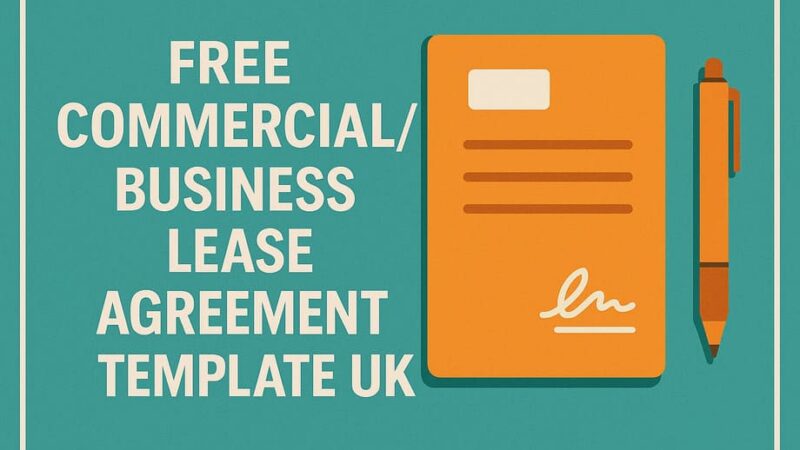
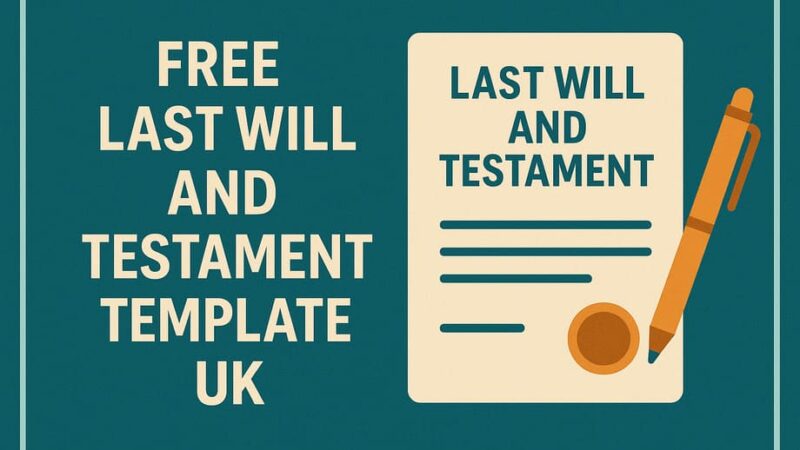
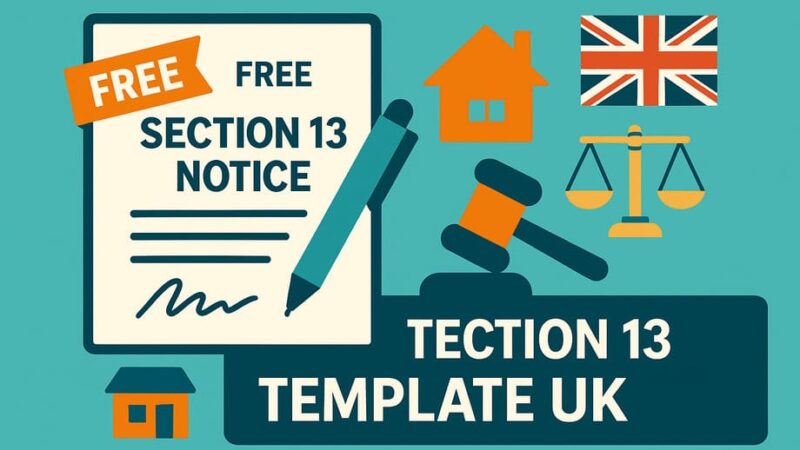
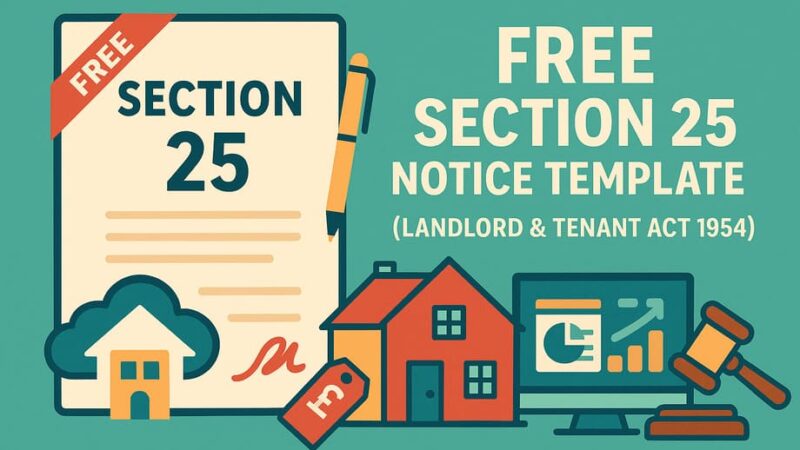
![Letter to Tenant for Late Rent Payment [Free Template] 6 Letter to Tenant for Late Rent Payment [Free Template]](https://www.yourpropertyblog.co.uk/wp-content/uploads/2025/08/letter-to-tenant-for-late-rent-payment-template-800x450.jpg)
![Letter to Landlord About Damp and Mould [Free Template] 7 Letter to Landlord About Damp and Mould [Free Template]](https://www.yourpropertyblog.co.uk/wp-content/uploads/2025/08/letter-to-landlord-about-damp-and-mould-template-800x450.jpg)